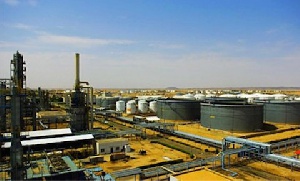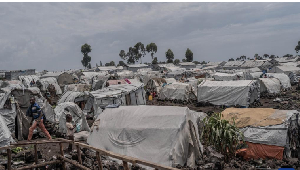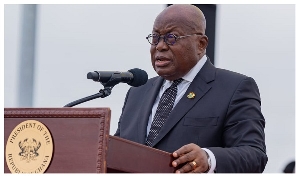- Home - News
- TWI News | TV
- Polls
- Year In Review
- News Archive
- Crime & Punishment
- Politics
- Regional
- Editorial
- Health
- Ghanaians Abroad
- Tabloid
- Africa
- Religion
- Election 2020
- Coronavirus
- News Videos | TV
- Photo Archives
- News Headlines
- Press Release
General News of Wednesday, 9 April 2014
Source: radioxyzonline
BDCs head for Court to stop BOST-TSL deal
The Ghana Chamber of Bulk Distribution Companies (BDCs) will Wednesday April 9, 2014 file an action at the court seeking an injunction to stop the handing over of the management of tank farms of the bulk oil supply company (BOST) to TSL - a Ghanaian subsidiary of a Nigerian owned company.
The BDC Chamber’s action, which is the latest step in its campaign to prevent the management of Ghana’s national petroleum stocks and highly sensitive strategic reserves from falling into unproven hands, will be heard at 1100 hours today at the Commercial Division of the High Court.
BOST’s actions, which the Ghana Chamber of the Bulk Distribution Companies contends is not in Ghana’s best interests, are being challenged on three main grounds, namely:
· The flagrant disregard of the Public Procurement Law in Sole Sourcing TSL to the exclusion of others
· The illegality of the whole transaction because of TSL not holding am operator’s licence issued by the National Petroleum Authority (NPA)
· The clear violation and breach of the Government’s publicly declared commitment to promote the deepening of Ghanaian local content at all sectors of the economy, especially in the Oil & gas industry.
· Brief on BOST
THE BDCS The Bulk Distribution Company’s (BDCs) function was established under the National Petroleum Authority (NPA) Act 691 (2005) to encourage local participation and investment in the oil downstream sector, in line with government policy set in the late 1990s, to deregulate the petroleum industry. Deregulation became a pillar of government zeitgeist in the quest to remove major fiscal constraints from the government’s budget. In pursuance of this, BDCs were expected to:
1. Import, store, and distribute refined petroleum products.
2. Bulk sell (wholesale) petroleum products to Oil Marketing Companies (e.g. Shell, Goil etc.) from Ghanaian refineries and licensed petroleum importers.
3. Invest in supply chain infrastructure to augment existing investments by government- (tank farms, CBM/SPM etc.)
BDC imports accounted for 65% of product supplies to the country for the period 2006 and 2012. In 2011, 2012 and 2013, BDCs accounted for over 98% of petroleum product supplies to the market. Our function is the reason for the absence of shortages. Consequent to the deregulation policy, BDCs have invested over $180m in the construction and operation of tank farms with combined capacity in excess of 250million litres. Additional investments are on-going to increase private capacity to over 350 million litres. BDCs (all mainly Ghanaian-owned companies) have a proven capacity and competence in managing such facilities and have proven ability to run a sector hitherto controlled by foreign companies.
BOST Incorporated in 1993 as a private Limited Liability Company with the Government of Ghana as the sole shareholder.
BOST has the mandate to develop a network of storage tanks, pipelines and other bulk transportation infrastructure throughout the country to keep Strategic Reserve Stocks for Ghana. It currently has an infrastructure capacity of about 420m litres. Despite retaining the BOST margin in the price build-up (GHP3/ltr) BOST has failed since 2008 to hold strategic stocks.
BOST made its facilities available to BDCs for the storage and distribution of their products. This yielded revenue in excess of $30m in the last 4 years. BDCs as a result of a zonalisation policy established by the Ministry of Energy and NPA continued to patronize the facility till BOST was unable to account for stock worth in excess of $52m. With BOST unwilling to commit to the payment of the lost stock (i.e timing and accruing cost of funds) and the continuous loss of stock, BDCs have since October 2013 rarely utilised the BOST facilities.
THE ISSUE In a said effort to cut the loss and revamp the organisation, the CEO (Kwame Awuah-Darko) opted to transfer the risk, instead of curing it by outsourcing the management of the terminals to TSL logistics Ghana Ltd, a Ghanaian subsidiary of a Nigerian-owned and based TSL Logistics Limited.
§ Local content § Existing local capacity ignored in favour of Nigerians § Unwillingness of Government to promote local companies in the sector. “If a government will not believe in its proven people, who will?”. How will local champions be built if foreigners are preferred where local capacity exists? Why Nigeria when Ghanaians can?
§ Foreign managed national strategic stocks § Why should a foreign company manage our country’s strategic stocks when Ghanaians can? Are there no risks in the event of war or major dispute with Nigeria? See what is happening with Nigeria’s supply of gas through the West African Gas Pipeline.
§ TSL capacity incomparable to Local capacity § TSL group’s operating experience stands at a combined capacity of 55m litres which is not up to the capacity of TTF (70m ltrs) or TFC (110m ltrs) or WOODFIELDS (75m Ltrs) terminals.
§ Excessive investment valuation § TSL is to invest up to $10m on CCTVs, SCADA systems, flow meters, tank gauges and gantry upgrade. This in our opinion is over 100% inflated. § Lack of Transparency in Contracting Procedure
§ Sole sourcing at the expense of the tax payer when it was so unnecessary with local capacity.
§ Scheming to have TSL and their Trading partners control the Ghana & Sahelian trade § BOST expects TSL’s trade partners to hold a minimum stock level under the disguise of strategic stocks and facilitate a release of 180,000mt monthly to the market (75% of market requirement), using its infrastructure and zonalisation policy to the disadvantage of local BDCs.
§ With TSL controlling the infrastructure (which extends to Bolga), their trade partners will control exports to the Sahelian markets. BOST sees this as major incentive for their Nigerian partners to deal. Why use Ghanaian tax payer’s money to build the commercial enterprises of other countries. BOST has been and continues to be funded by direct taxes and levies on petroleum products in Ghana. It is ludicrous that the companies that benefit from this will be Nigerian. § Wilfully crippling BDCs?
§ Government’s debt to BDCs continues to grow rapidly, and is gradually creating a liquidity crunch which will collapse banks and the Ghanaian economy. Is government planning to avoid resolving the challenges BDCs and Ghanaian banks face, seeking solace in Nigerian entities? §
BDCs position § We believe in the need to turnaround BOST and are not opposed to the intent to outsource the management of the terminals.
§ We as Ghanaians have been made to invest in competence and experience in managing terminals professionally. We have earned the right to be given priority consideration in utilising the opportunity to turnaround BOST and facilitate our trade locally and in the Sahelian markets.
§ Our value is retained in Ghana § We are willing through a consortium to take advantage of the opportunity BOST offers for mutual benefit and in the interest of the economy.
§ We fiercely oppose any act by government directly or through its agencies, to pass opportunities to foreign or foreign owned companies when indigenous capacity exists. § We petitioned the Minister and Board Chairman of BOST one clear week before the signing of the TSL contract. They failed to respond to our petition and went ahead to execute. Their Chairman has subsequently suggested they cannot reverse it due to Judgement debt.
§ Ghanaian law – sole-sourcing – should not be broken to favour foreign entities.
TSL • A member of the TSL group (tsllimitted.com)
• It is owned partly by Jide Tinubu (Younger brother of Wale Tinubu, CEO and major shareholder of Oando). It is unclear whether or not Wale Tinubu is part of it. However, it is known they manage most of Oando’s ATK facilities and transportation.
• Registered in Ghana in 2004 (as reported by BOST CEO) with minority Ghanaian shareholders.
• Ghanaian entity not registered with the NPA and has operated no facility ever in Ghana.











